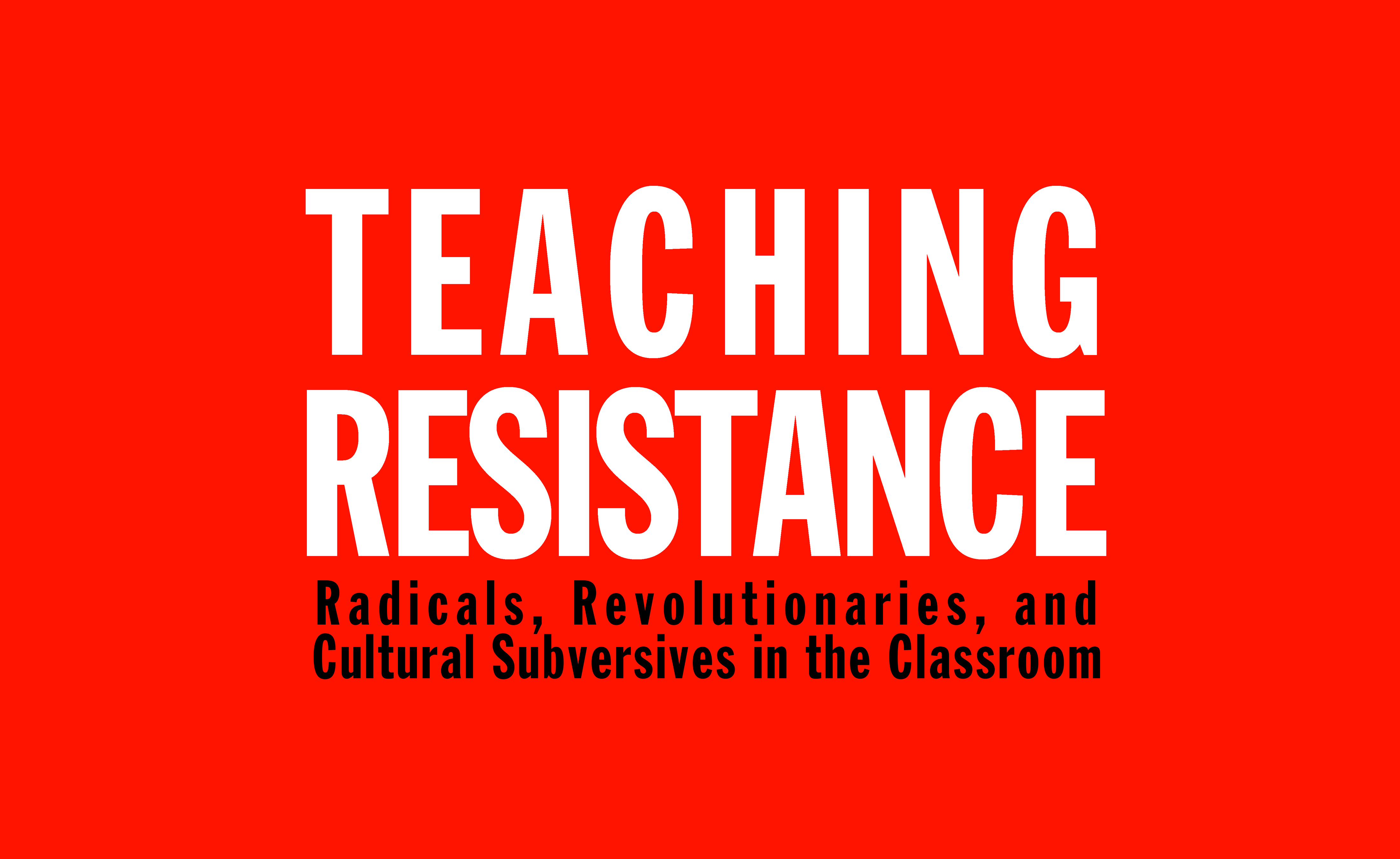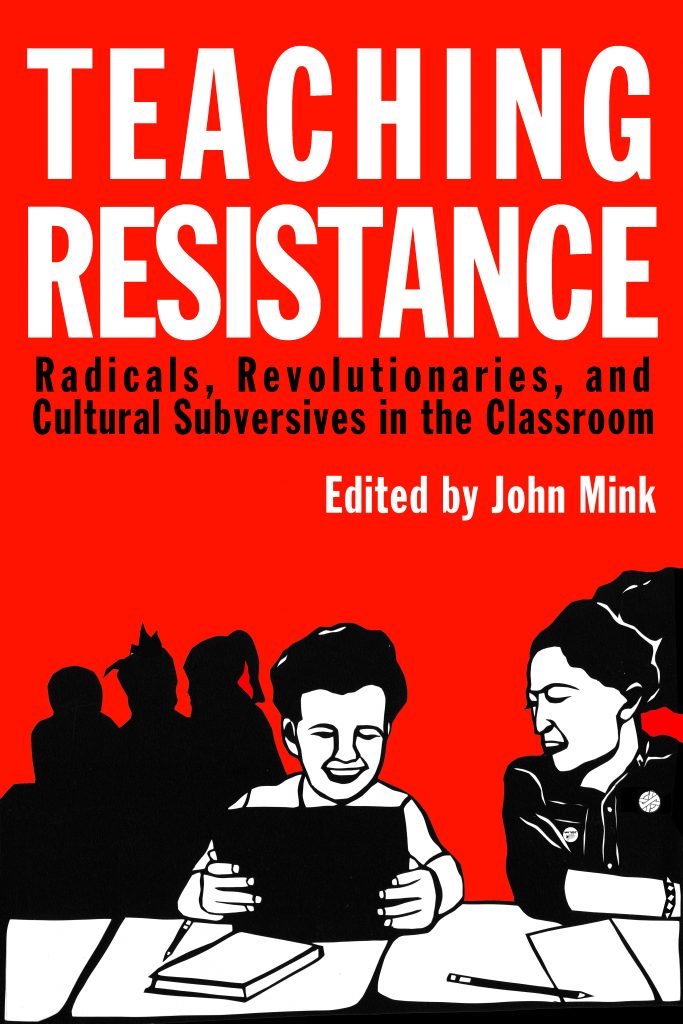By Nick Odorizzi
MaximumRockNRoll
May 2020
Writing this review is so surreal. I began reading this book in my 8th grade classroom and am finishing up the review sitting at home after being quarantined indefinitely. The world is at a standstill, and people are fighting for their lives in the first global pandemic in a century. For teachers, traditional pedagogy has been replaced by Zoom meetings, concerned parents, and a constant worry that students have access to basic necessities like food and a safe place to live. The world changed on us very quickly, but teachers (most of the ones I know, at least) are still doing what they can to provide equitable resources to students with compassion and patience. Teaching Resistance is a guide for those of us who are trying our best to create a safe, nurturing space where our students’ needs are met in the least restrictive, most progressive ways. If you are into punk, radical politics, activism, or are looking for a practical, relevant education book that is student-centered and real, skip this review and just go buy it. Better yet, get your school to buy it for you.
Teaching Resistance, edited by Fleshies vocalist and teacher John Mink, collects and expands on entries from MRR’s column of the same name. It includes essays from educators, writers, and students all across the world (particularly interesting are the insights given into politically/culturally repressive areas like Palestine, Serbia, Bible Belt America, and even prison). It also has engaging interviews with radical teachers, including punk lifers like Alice Bag and Martin Sorrondeguy (Los Crudos, Limp Wrist).
Although the perspectives are varied, the common threads that bind many of the pieces together are much like punk itself at its best: classrooms need to be anti-racist, anti-authoritarian, culturally relevant safe spaces where students and teachers feel comfortable to exchange ideas and work together to grow and learn. In these reflective essays, educators write about how their time spent in DIY punk enabled them to reach kids of all backgrounds. The techniques range from simple listening and caring to fighting forces that would threaten their safety. In his essay “Cops Out of Our Schools,” Mink expresses this by saying, “It has been shown, time and time again that teachers who are genuinely dedicated to the core (non-institutional) philosophies of their profession can, through radically innovative practices and active subversion of the institutional aspects of their jobs, play a major role in helping empower their students to take greater control over their own lives and potentially become catalysts for effective real structural-social change.” I can’t think of a better mission statement for modern teachers.
These accounts show the dedication many radical teachers have for their students and the sacred space of a peaceful, open learning environment. The chapter by dwayne dixon (the lowercase letters are intentional), a professor at the University of North Carolina, details how he confronted armed far-right agitators who were marching to protect a campus Confederate soldier statue right outside his classroom window. (Side note: a happy surprise for me was when one of my 8th grade students described her summer experience pulling down this controversial symbol of white supremacy). Similarly, there is a powerful essay describing how leftist and Antifa groups combatted Neo-Nazi riots right across from Berkeley High School. I don’t have to elaborate on how concerning the growing trends of conservatism, fascism, and anti-intellectualism are, but the reports from the front lines, as it were, show powerful people standing up and demonstrating what activism can accomplish.
Among the issues addressed in this collection that are of particular interest to me are ways of working with students who often “fall between the cracks” in the traditional public school structure. I am fortunate enough to work in a public creative arts magnet school that has a very diverse population, both racially and economically, and has a relatively large number of LGBTQIA+ students. I sympathize with students and teachers who have to spend time in places that are not accepting or equipped to best meet their needs. Chapters on reaching out to kids who have experienced trauma, working with the children of immigrants (Sorrendeguy’s lengthy interview was particularly insightful here, as was Bag’s, where she advocated for students learning in their first language), students who have physical and learning disabilities, and those who are not neuro-typical are so relevant and rare in standard educational texts, and I appreciate their inclusion and perspectives very much.
This is an excellent collection that I can’t recommend enough if you teach in any capacity. It is compassionate, thoughtful, and authentic. You never know who will walk through your classroom door, but it is your duty and privilege to connect to them and share ideas. In his interview, Sorrendeguy says, “I think that is how I think of education in general. It can really make that impact on somebody. My friends in Southern California used to talk about huellas; leaving fingerprints. We leave fingerprints everywhere. It’s like when people talk about a ripple effect. You’re leaving a mark, and you may walk away and go on in life, and you don’t even realize the fucking impact you made
John Mink is a social studies teacher who has worked at the high school and adult school levels, and who refuses to hide his political radicalism from his students. He has been a contributing writer and editor for underground publications and zines including Slingshot, Absolutely Zippo: A Fanzine’s Anthology, and Collapse Board. Editor of the Maximum Rocknrollmonthly column “Teaching Resistance” and a vocalist/bassist for several internationally recognized punk bands, John lives in Berkeley, California, with his partner Megan March, who is also his bandmate in the truewave/punk group Street Eaters.







